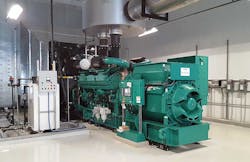Virginia Ends Effort to Shift Data Centers to Generators in Grid Alerts
Virginia environmental regulators have withdrawn an initiative to make it easier for data centers in Loudoun County to run on diesel generators in the event of a grid emergency, based on industry feedback that data centers were unlikely to participate.
The measure was described as a precautionary step to protect the region's power grid, which is facing constraints due to the rapid growth of the data center industry. On April 12 the Virginia Department of Environmental Quality (DEQ) said it canceled the proposed variance, which would have eliminated penalties for data centers that switched to generator power to reduce the strain on the electrical grid, freeing up more electricity for residential customers. The proposal was similar to practices during grid alerts in California, but the DEQ said that it proved unnecessary.
"Given further discussion with stakeholders and public comment on the proposal, DEQ believes that these issues are now being addressed between the data centers, the utilities, and the regional transmission organization (PJM interconnect)," the agency said.
The proposal was meant to address concerns for the area in which there may not be a sufficient amount of electricity for data centers due to severe, localized constraints in electricity transmissions through 2025.
Virginia regulates the number of hours that data centers can run their diesel generators, while allowing exemptions for grid emergencies. The proposed DEQ variance goes a step further to waive those restrictions, while requiring companies to track and report their generator runtime and emissions.
But no data centers had indicated they would use the variance, according to the Data Center Coalition, an industry group for data center operators, which cited "important and unresolved technical, federal regulatory, and operational challenges" with the proposal.
A Utility Program Would Be More Effective
A key issue is the lack of a demand response program in the region, which would provide structured incentives for data centers and other large users to reduce demand on the grid by shifting to on-site generation.
"We recognize that data centers can play an important role in bringing stability to the grid," wrote Josh Levi, President of the Data Center Coalition, noting that some states have initiatives managed by grid operators and utilities to shed load when there is acute grid stress or peak demand.
"While we are not aware of a program currently offered through Dominion Energy, we welcome the opportunity to work with the Administration, DEQ and other government agencies, PJM, utilities, and other stakeholders to identify and implement holistic solutions and programs to address the transmission constraint in Eastern Loudoun County and ensure a strong, resilient, and reliable grid," said Levi.
Power constraints in Northern Virginia have been in the news since last summer, when Dominion Energy began telling data center companies that power for some new facilities in Eastern Loudoun County will be delayed until 2026 due to bottlenecks in the utility’s transmission infrastructure, which has not kept pace with the dynamic data center growth in Northern Virginia.
The baseline challenge is that data center demand in Northern Virginia is growing faster than the utility grid. The region houses data centers that support Internet hyperscale platforms like Amazon Web Services, Microsoft, Google and Meta, as well as many enterprise companies. There is 26 million square feet of data center space in Loudoun County, with about another 5 million square feet in development, and many more projects in the planning stages.






